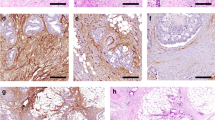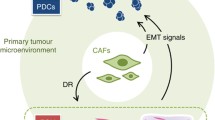Abstract
Recent study has shown that there is a close association of desmoplastic reactions (DRs) with the survival of patient with colorectal cancer (CRC). Here, we examined the correlation of DR classification with disease-free survival and overall survival of CRC. Moreover, we also investigated the association of the histological transition of the DR with the expression of cancer-associated fibroblast (CAF)- and epithelial-mesenchymal transition (EMT)-related proteins in CRC in stages II and III. We examined 157 cases of stage II CRC and 163 cases in stage III. We classified DRs into mature, intermediate, and immature types and examined the correlation of the DR patterns with patient survival. Next, the expression of CAF- and EMT-related markers was examined in CRC samples using immunohistochemistry. In stage II CRC, we found a significant correlation of disease-free survival with DR subtype (immature vs mature) in univariate and multivariate analyses. In stage III CRC, however, such association was not identified. Finally, the DR was closely associated with two EMT-related markers in stages II and III CRC. Our findings suggest that classification of the DR may help to predict patient prognosis in CRC. Furthermore, classification of the DR is correlated with the expression of EMT-related proteins.




Similar content being viewed by others
Data Availability
The datasets used and/or analyzed during the current study are available from the corresponding author on reasonable request.
Abbreviations
- CAF:
-
Cancer-associated fibroblast
- CRC:
-
Colorectal cancer
- TMA:
-
Tissue microarray
- DR:
-
Desmoplastic reaction
- MMP7:
-
Matrix metalloproteinase-7
- FSP1:
-
Fibroblast-specific protein 1
- PFDFRα:
-
Platelet-derived growth factor receptor alpha,
- PDGFR-β:
-
Platelet-derived growth factor receptor beta
- FAP:
-
Fibroblast activation protein,
- ZEB1:
-
Zinc finger E-box binding homeobox 1
- TWIST1:
-
Twist-related protein 1
References
Siegel RL, Miller KD, Goding Sauer A, Fedewa SA, Butterly LF, Anderson JC et al (2020) Colorectal cancer statistic. CA Cancer J Clin 70(3):145–164
Puppa G, Sonzogni A, Colombari R, Pelosi G (2010) TNM staging system of colorectal carcinoma: a critical appraisal of challenging issues. Arch Pathol Lab Med 134(6):837–852
Lugli A, Kirsch R, Ajioka Y, Bosman F, Cathomas G, Dawson H et al (2017) Recommendations for reporting tumor budding in colorectal cancer based on the International Tumor Budding Consensus Conference (ITBCC) 2016. Mod Pathol 30(9):1299–1311
Moccia F, Tolone S, Allaria A, Napolitano V, Rosa D, Ilaria F et al (2019) Lymph node ratio versus TNM system as prognostic factor in colorectal cancer staging. a Single Center Experience. Open Med (Wars) 14:523–531
Meyerhardt JA, Mayer RJ (2005) Systemic therapy for colorectal cancer. N Engl J Med 352(5):476–487
Gunderson LL, Jessup JM, Sargent DJ, Greene FL, Stewart AK (2010) Revised TN categorization for colon cancer based on national survival outcomes data. J Clin Oncol 28(2):264–271
Watanabe T, Muro K, Ajioka Y, Hashiguchi Y, Ito Y, Saito Y, et al 2018. Japanese Society for Cancer of the Colon and Rectum. Japanese Society for Cancer of the Colon and Rectum (JSCCR) guidelines 2016 for the treatment of colorectal cancer. Int J Clin Oncol 23(1):1–34.
Ueno H, Ishiguro M, Nakatani E, Hashiguchi Y, Ito Y, Saito Y et al (2021) Prognostic value of desmoplastic reaction characterization in stage II colon cancer: prospective validation in a Phase 3 study (SACURA Trial). Br J Cancer 124(6):1088–1097
Calon A, Lonardo E, Berenguer-Llergo A, Ishikawa T, Uetake H, Murotani K et al (2015) Stromal gene expression defines poor-prognosis subtypes in colorectal cancer. Nat Genet 47(4):320–329
Becht E, de Reyniès A, Giraldo NA, Pilati C, Buttard B, Lacroix L et al (2016) Immune and stromal classification of colorectal cancer is associated with molecular subtypes and relevant for precision immunotherapy. Clin Cancer Res 22(16):4057–4066
Musa M, Ali A (2020) Cancer-associated fibroblasts of colorectal cancer and their markers: updates, challenges and translational outlook. Future Oncol 16(29):2329–2344
Gallo G, Vescio G, De Paola G, Sammarco G (2021) Therapeutic targets and tumor microenvironment in colorectal cancer. J Clin Med 10(11):2295
Ueno H, Konishi T, Ishikawa Y, Shimazaki H, Ueno M, Aosasa S et al (2014) Histologic categorization of fibrotic cancer stroma in the primary tumor is an independent prognostic index in resectable colorectal liver metastasis. Am J Surg Pathol 38(10):1380–1386
Saigusa S, Toiyama Y, Tanaka K, Yokoe T, Okugawa Y, Fujikawa H et al (2011) Cancer-associated fibroblasts correlate with poor prognosis in rectal cancer after chemoradiotherapy. Int J Oncol 38(3):655–663
Hamilton SR, Sekine S 2019. Conventional colorectal adenoma. WHO classification of tumours of the digestive system. International Agency for Research on Cancer, Lyon 170–173.
Sugai T, Yamada N, Eizuka M, Sugimoto R, Uesugi N, Osakabe M et al (2017) Vascular Invasion and Stromal S100A4 Expression at the invasive front of colorectal cancer are novel determinants and tumor prognostic markers. J Cancer 8(9):1552–1561
Shim HS, Kenudson M, Zheng Z, Liebers M, Cha YJ, Hoang Ho Q et al (2015) Unique genetic and survival characteristics of invasive mucinous adenocarcinoma of the lung. J Thorac Oncol 10(8):1156–1162
Hashimoto M, Uesugi N, Osakabe M, Yanagawa N, Otsuka K, Kajiwara Y, et al. Expression patterns of microenvironmental factors and tenascin-C at the invasive front of stage II and III colorectal cancer: novel tumor prognostic markers. Front Oncol. 2021;11:690816.
Yang Z, Zhang C, Qi W, Cui C, Cui Y, Xuan Y (2018) Tenascin-C as a prognostic determinant of colorectal cancer through induction of epithelial-to-mesenchymal transition and proliferation. Exp Mol Pathol 105(2):216–222
Murakami T, Kikuchi H, Ishimatsu H, Iino I, Hirotsu A, Matsumoto T et al (2017) Tenascin C in colorectal cancer stroma is a predictive marker for liver metastasis and is a potent target of miR-198 as identified by microRNA analysis. Br J Cancer 117(9):1360–1370
Zlobec I, Lugli A (2010) Epithelial mesenchymal transition and tumor budding in aggressive colorectal cancer: tumor budding. Oncotarget 1(7):651–661
Tommelein J, Verset L, Boterberg T, Demetter P, Bracke M, De Wever O (2015) Cancer-associated fibroblasts connect metastasis-promoting communication in colorectal cancer. Front Oncol 5:63
Zhang W, Shi X, Peng Y, Wu M, Zhang P, Xie R, et al 2015. HIF-1α promotes epithelial-mesenchymal transition and metastasis through direct regulation of ZEB1 in colorectal cancer. PLoS One 10: e0129603.
Krebs AM, Mitschke J, Lasierra Losada M, Losada M, Schmalhofer O, Boerries M et al (2017) The EMT-activator Zeb1 is a key factor for cell plasticity and promotes metastasis in pancreatic cancer. Nat Cell Biol 19(5):518–529
Chen L, Gibbons DL, Goswami S, Cortez MA, Ahn YH, Byers LA et al (2014) Metastasis is regulated via microRNA-200/ZEB1 axis control of tumour cell PD-L1 expression and intratumoral immunosuppression. Nat Commun 5:5241
Terry S, Savagner P, Ortiz-Cuaran S, Mahjoubi L, Saintigny P, Thiery J et al (2017) New insights into the role of EMT in tumor immune escape. Mol Oncol 11(7):824–846
Acknowledgements
We gratefully acknowledge the technical assistance and support of members of the Department of Molecular Diagnostic Pathology, Iwate Medical University.
Author information
Authors and Affiliations
Contributions
M. Hashimoto, who is the first author, constructed the figures and tables and performed the statistical analyses. Y. Kajiwara and H. Ueno supported pathological interpretation of the DRs. M. Sugai, N. Yanagawa, and N. Uesugi helped in the interpretation of pathological findings. K. Otsuka and A. Sasaki provided clinical support during the preparation of the manuscript. T. Sugai, who is the corresponding author, contributed to the preparation of the manuscript, including all aspects of the data collection and analysis.
Corresponding author
Ethics declarations
Ethical approval and consent to participate
Informed consent was obtained from each patient according to institutional guidelines, and the research protocols were approved by the ethics committee of Iwate Medical University Hospital (approval number MH2021-028).
Human rights statement and informed consent
All procedures were performed in accordance with the ethical standards of the Iwate Medical University and with the Declaration of Helsinki. Substitute for informed consent (approval by the institutional review board of Iwate Medical University) was obtained from all patients included in the study.
Consent for publication
Not applicable.
Conflict of interest
The authors declare no competing interests.
Additional information
Publisher's note
Springer Nature remains neutral with regard to jurisdictional claims in published maps and institutional affiliations.
Supplementary Information
Below is the link to the electronic supplementary material.
Rights and permissions
About this article
Cite this article
Hashimoto, M., Uesugi, N., Sugai, M. et al. Desmoplastic reactions and epithelial-mesenchymal transition proteins in stages II and III colorectal cancer: association with and prognostic value for disease-free survival. Virchows Arch 480, 793–805 (2022). https://doi.org/10.1007/s00428-021-03266-4
Received:
Revised:
Accepted:
Published:
Issue Date:
DOI: https://doi.org/10.1007/s00428-021-03266-4




